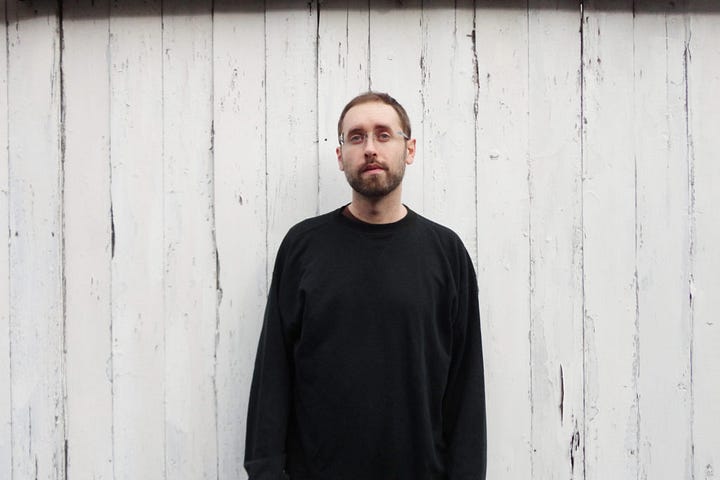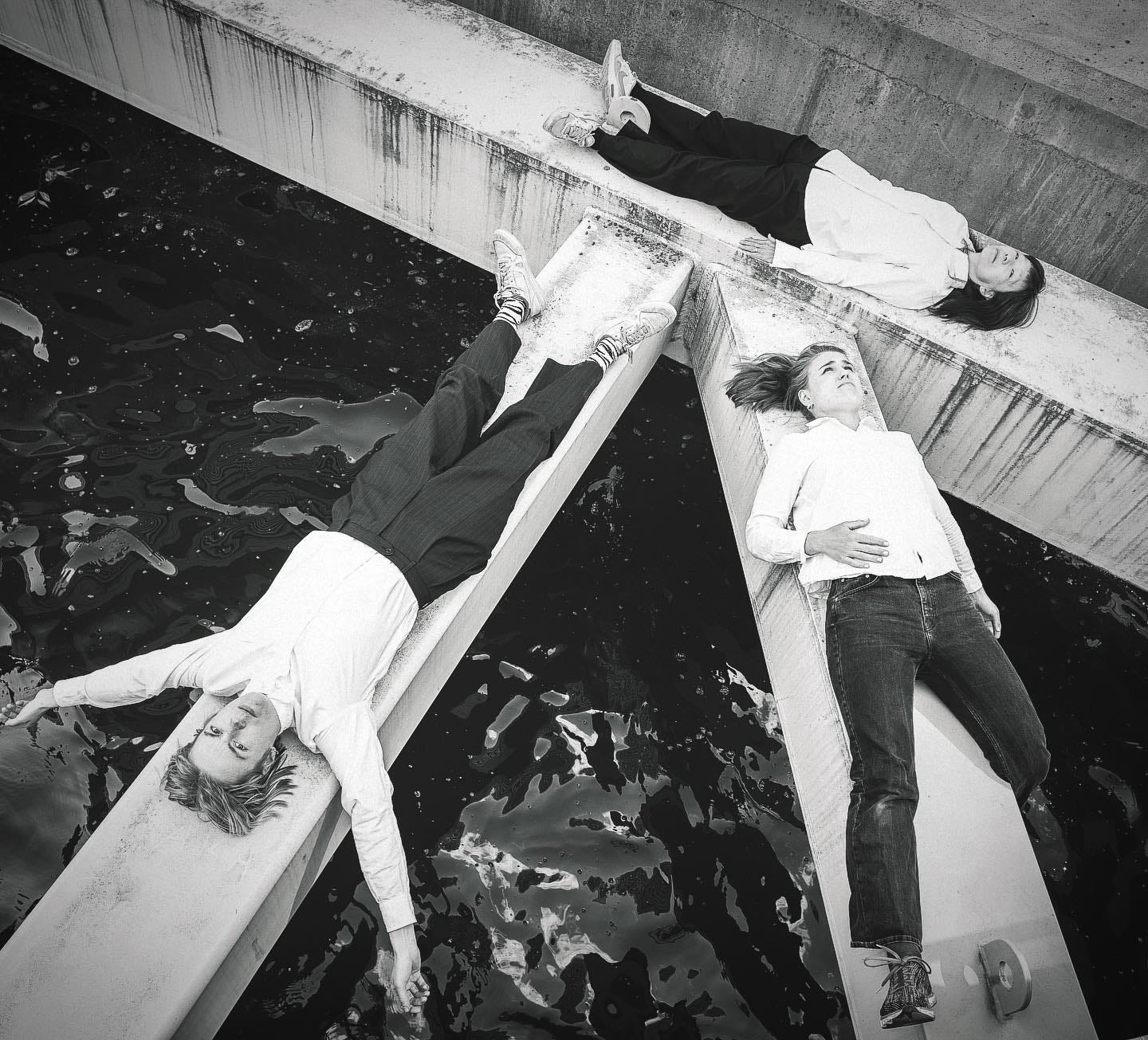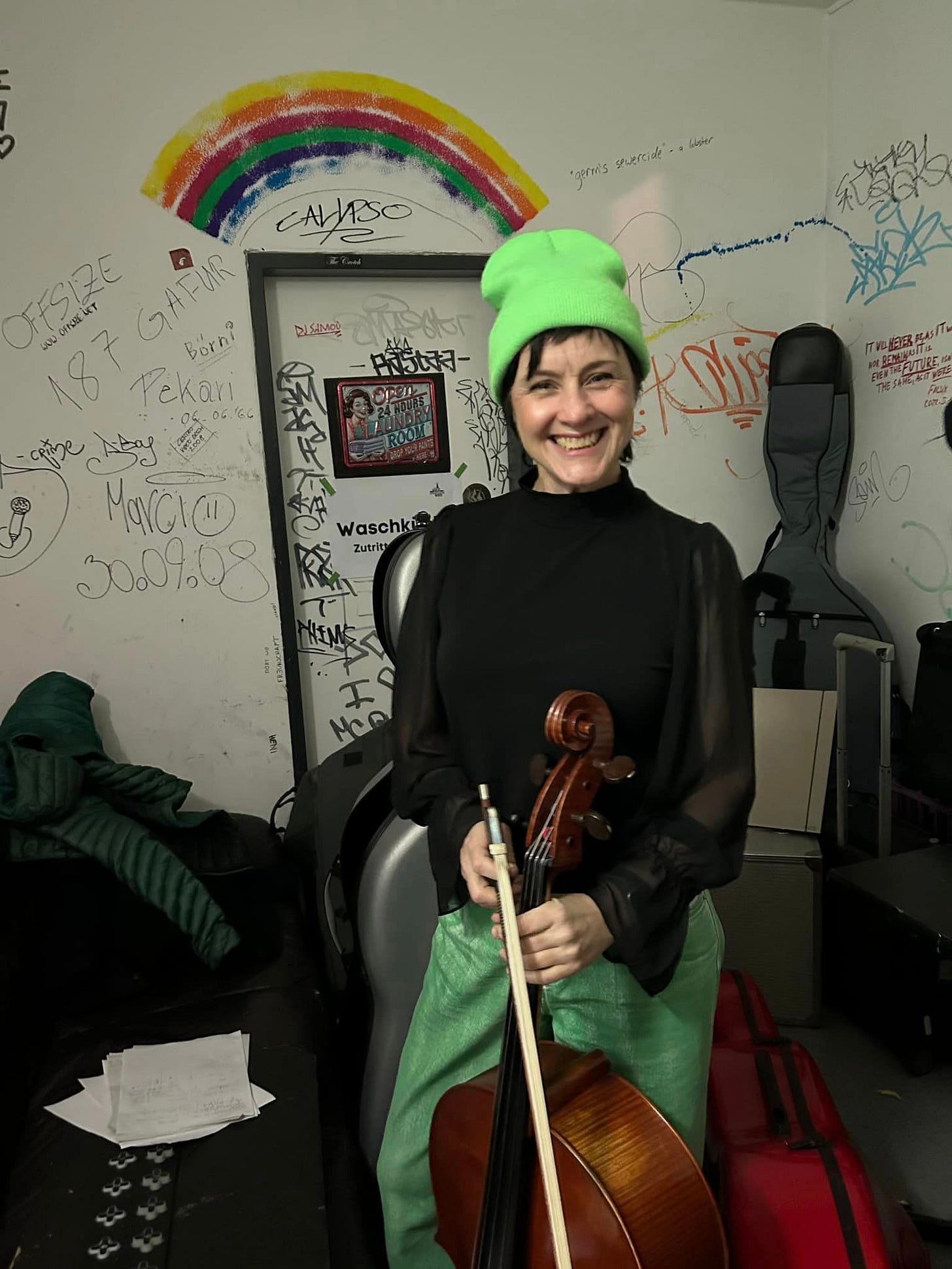Feverish Spring Action
Space, Hanno Leichtmann & Valerio Tricoli, Katinka Kleijn, Luigi Marino & Mandhira de Saram
Carving out Space With Lisa Ullén, Elsa Bergman, and Anna Lund
I couldn’t be happier to present the Swedish trio Space as the first Nowhere Street concert of 2024. The group—pianist Lisa Ullén, bassist Elsa Bergman, and drummer Anna Lund—will perform on Thursday, March 28 at KM28, just a couple of weeks after the release of its second album Embrace the Space (Relative Pitch). Ullén has been on fire, deftly straddling the divide between composed and improvised work in a variety of superb ensembles, with some of her strongest work arriving this year. Last month she released Heirloom (Fönstret), a stellar solo recording that features vividly disparate takes on the same three-movement suite on each side of the LP. From the beginning Ullén has kept the boundaries between improvised and notated music hazy, and the solo recording achieves a new apotheosis for bridging those practices.
She has long displayed a mastery of extended techniques, particularly with preparations and inside the piano manipulations, but on first listen I was certain that she had deployed electronics. Yet apart from using an e-bow here and there, Ullén creates all of these strange effects—particularly the fuzzy white noise shadings on “After Sun”—without any effects. Across the entire recording, which was recorded live over three consecutive lunchtime performances at the venerable Stockholm space Fylkingen in June of 2023, she dissolves all sorts of borders: composed vs. improvised, pure sound vs. a mediated timbre, as if it was the most natural thing in the world. She nonchalantly changes up her methods on each iteration of the suite, fracturing melodic and rhythmic phrases in new ways, toggling between infectiously jagged propulsion and immersive, sustained sound. No single album, let alone one piece, can indicate the full sweep of her playing, but below you can check out the version of the title piece she recorded on the third day of the project.
The members of Space have worked together for years now, spending a concentrated stretch of time as the rhythm section in the sublime Anna Högberg Attack! I was immediately taken with the trio’s eponymous debut album for Relative Pitch, which was recorded during the pandemic in 2021, but after getting to hear the band live in Berlin and Saalfelden since then it’s clear that Space has evolved dramatically, locking into a tight ensemble sound, tightening the fuzzier strands from the first record into an imperturbable force. Each improvised performance, including the one on Embrace the Space, has been unique, pushing into discrete sound worlds, but what has united them for me is the way Bergman and Lund have honed an almost telepathic rapport that allows them to sculpt infectious yet elusive shape-shifting grooves—a gift for a pianist as versatile as Ullén, who rides those rhythms with uncanny confidence and experimentation. Sometimes she sits in the volatile pocket Bergman and Lund carve out, sometimes she splashes out notes that confront it. Nothing ever stays in the same place for long, but that doesn’t mean there isn’t stunning continuity in the fluid patterns and sonic relationships that come fast and furious. Ullén doesn’t really strip down or simplify her approach within Space—there’s inside the piano interrogations here and there, as on the deliciously slow ballad-like “The Immeasurable”—but everything moves much faster here, as the churn of ideas threatens to explode the whole endeavor. Of course, things never collapse. The trio has a quicksilver ability to sort of out solutions or simply welcome any such disintegration in real time. Below you can check out one of the album’s most explosive and extroverted pieces, “All at Once.”
KM28 is Back in Action
KM28 has been dark since December, allowing for sound insulation to be installed, so this week marks the venue’s welcome reopening. Berlin fixtures Hanno Leichtmann and Valerio Tricoli celebrate the release of their third duo album Cinnte Le Dia (Ni Vu Ni Connu) with a performance at the space on Wednesday, March 27. I actually hadn’t heard their work until just recently, but the new album carries on a bracing mix of ambient sounds, dirty grooves, and layers of unrecognizable and/or disfigured electronics, smudged and smeared by Tricoli’s virtuosic command of the Revox tape player. The pair improvise within a prescribed soundworld built around murky rhythms and small loops, patterns, and samples perpetually processed, stretched, and recombined. The duo has worked together for nearly a decade, releasing two previous albums for the British imprint Entr'acte, and over that time the music has grown more intuitive and fluid, investigating the possibilities of repetition and variation. Sometimes the music can feel a bit static with fragmentary rhythms struggling to support the more rapidly shifting foreground sounds, but I’m looking forward to hearing the duo live, witnessing the process in real time and see how much of what they do comes from prepared material and how much is spontaneous. Below you can check out “Sleepy Talking,” one of the more ambient-leaning tracks from the new album.
Sharing the bill is Chicago cellist Katinka Kleijn, who’s one of the most open-minded and curious musicians I’ve ever known. The Dutch musician has been a fixture on multiple segments of the Chicago music scene, and although she’s been a long-time member of the Chicago Symphony Orchestra, she’s probably known better for a commitment to new music, as a veteran presence in International Contemporary Ensemble. She arrived in Berlin a couple of weeks ago to play that ensemble’s program during Maerz Musik, but tonight she offers another side of her multifaceted practice. Over the years I’ve seen her participate in all kinds of interesting projects, whether playing music with fellow cellist Lia Kohl in a swimming pool, and allowing her brainwaves to control electronics while she plays cellos in a piece created with composer Daniel Dehaan and the performance art duo Industry of the Ordinary. She’s also made a gorgeous duo album with guitarist Bill MacKay for Drag City, she has commissioned genre-crushing works from Aliya Ultan and vocalist-bandleader Damon Locks, and last fall she played some European dates in a new iteration of Christof Kurzmann’s El Infierno Musical.
Sadly, there’s not a lot of Kleijn’s more experimental work out there, but that’s beginning to change. Last year the Chicago label Amalgam released Two or Three, an expansive account of the titular, heavily improvised Pauline Oliveros piece made with the late reedist Mars Williams and CSO bassist Rob Kassinger. The work was one of the composer’s last pieces before she died in 2016. It was commissioned as part of the CSO’s MusicNow series and it premiered in early 2017, but this version was recorded in March of 2018. Two extended free improvisations are interspersed with the three parts of the Oliveros work, and it portends an ongoing dissolution of the boundaries between written and composed work. There’s no score at all for the music on the 2021 album Sine Nomine (Fundacja Słuchaj), a fully improvised duo recording with violinist Mark Feldman—the virtuosic, highly versatile fixture on the New York jazz scene who returned to his native Chicago a few years ago, where’s he’s made a strong impact, especially through his membership in trumpeter Russ Johnson’s killer quartet.
Kleijn began developing her improvised music practice relatively late in her career, but inspired by the Chicago scene she’s jumped in head-first. Feldman is far more seasoned as an improviser, but they have a palpable bond. The bulk of the album is occupied by the 43-minute title piece, which wends through countless different motifs, methods, and modes, but subtle interplay is always present. Kleijn is sometimes deferential, gamely providing platforms for the violinist to strut his maniacal technique, but things never stay in a single zone for two long, as both players respond to shifting ground with quicksilver alacrity. They twine and joust, adjusting and probing in a manner that’s sometimes hard to keep up with. Below you can check out the second piece on the album, “Epilogus.” Kleijn’s improvised set on Wednesday draws on a variety of current interests: “working with feedback, a 9V home-made synthesizer that shares a circuit between my cello and my body, and work with solo cello improvisation, both acoustic and with electronics.”
Luigi Marino’s Sibilant, Sculptural Sound World
In early September of 2018, the first weekend of a year spent living in Rome, Jessie Marino and I were eager to check out the scene. I noticed that clarinetist Michael Thieke, who often spends time in the city, was playing an improvised gig with Luigi Marino, an Italian percussionist who lives in the UK. It took us about an hour to make it to the venue, an experience that foreshadowed how many things in the city were completely unreliable if not utterly broken: luckily the music was good and the hang was nice. I had never heard of Marino, who played some sort of bespoke cymbals for the gig, and his name didn’t really surface again for me until the release of Native Languages of Nowhere (Emergent Idioms) in early 2022, a minimalist endeavor recorded with Thieke marked by different sorts of striated sounds—mostly bowed cymbals and richly tactile unpitched breaths. A lot of what they do together sounds electronic, but as far as I know it’s all acoustic. I enjoyed the music and the pair built on a strong aesthetic bond that was palpable at the Rome performance.


More recently I encountered Marino again on a new duo effort with Mandhira de Saram, a violinist originally Sri Lanka whose uncle is the brilliant cellist Rohan de Saram. Mandhira moved to London for her secondary education, and later co-founded Ligeti Quartet, which earned a reputation for collaborating outside of the new music world (she no longer plays in the quartet). But I’ve found her improvising on The Council of Two, released in February, to be far more compelling, and her connection with Marino is dazzling. For this project Marino only uses electronics, but his sound world is of a piece with what he brought to the Thieke duo. Again, the music is minimal in nature, but de Saram does nothing to disguise the fact that she’s playing a violin—which isn’t to say Thieke is trying to defy his instrument, only that his vocabulary pushes well beyond the instrument’s usual language and sound. In fact, on “Yaksha,” the piece that opens the album, de Saram draws upon plenty of standard violin language. But Marino’s electronics provide such a delightfully unexpected foil that it hardly matters. I’m not sure what Marino is using, but on this opening piece he seems to be dealing primarily with feedback as a sculptural object. Amusingly, in the opening minutes he makes feedback sound more like clarinet, albeit a bass clarinet thick with rheumy overblowing, than Thieke’s own playing does!
My favorite piece is “Scattermacron,” which you can hear below. Marino brings a more tactile aggression with his electronics that’s quite percussive at times, and as the piece opens de Saram engages with him through taut pizz tones, together conjuring a lovely pointillism. But with any good improvisation what often matters most is the interaction between the players rather than a particular stylistic focus, and these two have a special connection. In some ways this session suggests a less peripatetic analog to the violin-electronics duo of Angharad Davies and Phil Julian. Both projects deploy very small gestures, and while de Saram and Marino tend to ride out certain sequences longer than the Davies and Julian, their devotion to hyper-focused exchange is similar.
Recommended Shows in Berlin This Week
March 26: Matthias Müller, trombone, Reiko Okuda, piano, and Samuel Hall, percussion, 8:30 PM, Morphine Raum, Köpenicker Straße 147, 10997 Berlin (Hinterhof 1. Etage)
March 27: Valerio Tricoli & Hanno Leichtmann; Katinka Kleijn, 8:30 PM, KM28, Karl Marx Straße 28, 12043 Berlin
March 27: The Bad Plus, 8:30 PM, Gretchen, Obentrautstr. 19-21, 10963 Berlin
March 27: Die Enttäuschung (Axel Dörner, trumpet, Rudi Mahall, clarinets, Jan Roder, double bass, and Michael Griener, drums), 8:15 PM, Badenscher Hof, Badensche Straße 29, 10715 Berlin
March 28: Julia Hülsmann Quartet (Julia Hülsmann, piano, Uli Kempendorff, saxophone, Marc Muellbauer, double bass, and Heinrich Köbberling, drums), 8:30 PM, Jazz Club A-Trane, Bleibtreustraße 1, 10625 Berlin
March 28: Silke Eberhard’s Potsa Lotsa XL with Jose Davila, 8:30 PM, Kuhlspot Social Club, Lehderstrasse 74-79, 13086 Berlin
March 28: Space (Lisa Ullén, piano, Elsa Bergman, double bass, and Anna Lund, drums), 8:30 PM, KM28, Karl Marx Straße 28, 12043 Berlin
March 29: Dag Magnus Narvesen Kvintett (Axel Dörner, trumpet, Tobias Delius, reeds, Håvard Wiik, piano, Antonio Borghini, double bass, & Dag Magnus Narvesen, drums) 8:30 PM, Sowieso, Weisestraße 24, 12049 Berlin
March 29: 90—New music by Ernstalbrecht Stiebler, in celebration of the composer’s 90th birthday (performed by the Stiebler, cellists Michael Rauter and Tilman Kanitz, vocalists Christian Kesten and Dylan Kerr, and pianist Hartmut Leistritz), 5 PM, Acker Stadt Palast, Ackerstraße 169, 10115 Berlin
March 30: Declan Forde Quartet (Michaël Attias, alto saxophone, Declan Forde, piano, Nick Dunston, double bass, and Leo Gerstner, drums), 8:30 PM, Donau115, Donaustraße 115, 12043 Berlin
March 30: Dag Magnus Narvesen Kvintett (Axel Dörner, trumpet, Tobias Delius, reeds, Håvard Wiik, piano, Antonio Borghini, double bass, & Dag Magnus Narvesen, drums) 8:30 PM, Sowieso, Weisestraße 24, 12049 Berlin



